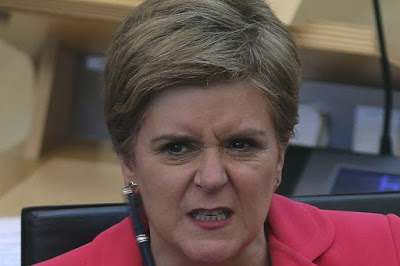The UK is divided in multiple ways. It is threatened by
Scottish nationalism and Irish nationalism. It is divided by people who wish to
rejoin the EU and by those who resent the Remainer rearguard that has continued
even beyond our actually leaving. The destruction of Liz Truss and the
coronation of Rishi Sunak look oddly like a part of that rearguard even if
Sunak supported Brexit because he is King of the Remainer wing of the
Conservative Party. But if Remainers and the Tory Wets are once more in control
and with Labour likely to win the next election, is it more likely now that the
UK will rejoin the EU?
The problem for Rejoiners is that the EU we left
like Heraclitus’ river is not the same. You cannot step into the same EU twice.
The UK in 2016 had opt outs for the Euro and for Schengen. We had a rebate
negotiated by Margaret Thatcher. But more importantly than all that in 2016 we
had not yet left.
We have gone through the process of leaving and seen
the EU negotiate in such a way that it wished to make it clear to other member
states and the UK that leaving must be seen to be detrimental. The price of
leaving must be Northern Ireland. The UK must be metaphorically knee capped in
a punishment beating.
Well, if the UK wanted to rejoin what would the
conditions be? Would the EU wave the conditions of entry in the Copenhagen criteria?
Come back you can be just like you were. There is no need to adopt the Euro. No
need for Schengen. Or would we still have the tough EU negotiator?
It is impossible to predict how the EU would respond
to a UK attempt to rejoin. De Gaulle rejected UK membership because he didn’t think
the UK would ever really embrace the project. We didn’t. We wanted a common
market to help our trade, but we rejected everything else. There was minimal
enthusiasm for “ever closer union” and Euro federalism even among Remainers. Few
even among the Lib Dems wanted Schengen and the Euro.
The only UK party at present that supports rejoin, the
SNP also rejects Euro federalism, doesn’t want to join the Euro and only wants Schengen
if Scotland can stay in the Common Travel Area. But the EU has just told
Scotland “No Euro, no membership”. But if it is saying that to Pro EU Scotland,
why would it not say the same to Brexiteer Britain?
Ireland has an opt out from Schengen, so if the UK
were required to join Ireland would have to join too. But Ireland has no
objection to Schengen in principle. It only has the opt out because the UK
objected to borderless travel within the EU.
So, this is our problem. In a couple of years, we will
probably have a Labour Government full of Remainers. It may depend on the votes
of Remainer Lib Dems and Remainer SNP. The Conservative opposition will be dominated
by Remainers. But how do they rejoin the EU?
Rejoining the EU involves the following steps
1 Promising to join the Euro
2 Joining Schengen
3 Joining the ERM II (remember ERM I?)
4 Giving up the pound.
But this means that the UK Chancellor would also have
to give up control of monetary policy. The Bank of England could not raise or
lower interest rates, nor could it print Euros. The European Central Bank would
instead control everything and be our lender of last resort.
Joining Schengen would mean that not only every EU
citizen could arrive in the UK without passport checks, but every non-EU
citizen who made it into the Schengen zone. There would be no need for Afghans
or Syrians or anyone else to go to the trouble of attempting to arrive on UK
beaches by means of dinghies, they could instead get on the Eurostar. The Home
Secretary could no more stop them than Canute could stop the tide.
More important than all of these things is that
Schengen and the Euro are the means by which the EU wishes to achieve Euro
federalism. If every EU member state had open borders and shared the same
currency it would be close indeed to becoming a United States of Europe. If the
UK were to join the Euro it might be a step forward to persuading Denmark,
Sweden, Poland and others to do likewise.
But there is no way that the UK voters would choose to
rejoin the EU if it involved Schengen and the Euro. Try winning a referendum on
that. The only way is for Labour with the consent of the Conservatives to rejoin
the EU without a referendum just like we joined the EC in 1973.
Parliament is sovereign and can do just that.
Parliament can vote to join the ERM and adopt the Euro. It can vote to join
Schengen. And that would be that.
We learned from Greece in 2015 that once you are in
the Euro there is no way out and there certainly would be no way out for the UK
as it would involve a default. Giving up the pound to join the Euro only to
give up the Euro to regain the pound would make the recent economic chaos look like
Truss was our most successful Prime Minister.
But once in the Euro the UK like all the other wealthier
EU members would face the prospect of fiscal transfers to the poorer EU member
states. British tax payers may be happy to subsidise Scotland, Wales and Northern
Ireland, but would we be happy to subsidise Slovakians when we cannot point out Bratislava
on a map? Well happy or not we would have to. That is the point of the Euro. It
is to turn the EU into a state.
The UK faces long term strategic difficulties caused
by our attempt to be half in and half out of the EU and by our failure to defend
the UK’s territorial integrity as other nations routinely do. This has left us
vulnerable to both Scottish independence and the loss of Northern Ireland due
to changing demographics.
The UK can sensibly go down the Brexit route, but it
has either to take Northern Ireland with it completely or come to an agreement
with the EU and Ireland to lose it. The Protocol is merely a failure to choose.
But to assert the territorial integrity of the UK
requires it to reject the Belfast Agreement, which the people of Northern
Ireland voted for in 1998 and risks violence. But there is no point pumping billions
into Northern Ireland each year if you are going to give it away eventually.
There was no point fighting a war for thirty years either. We would have been
better to have given it away in 1968.
The Brexit route involves divergence from the EU and undercutting
it by making British business and industry more productive, efficient and with less
bureaucracy. But since leaving the EU we have not made any such steps at all.
We have gained little if any strategic advantage from Brexit, partly because we
accepted the EU’s punishment. The Backstop and Protocol hobbled us just as much
as if the knee capping were real. We allowed
the EU and Ireland to make Northern Ireland the price we had to pay for Brexit.
It is this that prevents us diverging.
The UK is now still half in and half out. We were unenthusiastic
members of the EU and we are unenthusiastic non-members of the EU. It’s time to
choose, because the Revelation is this. We are neither hot nor cold, which
makes us merely lukewarm sick.
Rejoining looks impossible, but it would solve some of
the strategic issues. If the UK were to be an EU member state, Scottish independence
would cease to have a point. We now know it would involve Scotland ceasing to
be a part of the EU and having to apply to join from scratch. This would involve
Scotland either using the Euro unofficially or setting up its own currency only
to have to join the ERM II and finally use the Euro again.
But for what? If the UK rejoining the EU added rocket
fuel to Euro federalism, secession movements would have no point unless they involved
leaving the EU. Catalonia leaving Spain looks awfully like Northern California
splitting from Southern California. But so too uniting Ireland looks awfully
like West Virginia rejoining the rest of Virginia. It would make the IRA bombing
campaign as pointless as the British resistance to it. We would all be part of
the same country again. Call it the UK or call it the EU. What would be the
difference?
The choice for the UK is either to make Brexit work,
assert our territorial integrity and diverge from the EU, or to embrace fully
the EU including Euro federalism. Failure to choose is more damaging than
either alternative and has been so for decades.







